- Home
- Beryl Kingston
Francesca and the Mermaid Page 7
Francesca and the Mermaid Read online
Page 7
Now there was nowhere else to look except the kitchen and she knew that Agnes wasn’t there. She crept into the room, noticing the pile of crumpled washing, the heaps of rubbish on the dresser, all those flowers in their crazy containers. The signs had all been there, right from the beginning only she hadn’t seen them. Oh dear, oh dear, what could she do? The kitchen door was ajar, so she stepped out into the lovely clean sunshine. There was nowhere else she could go.
Agnes was sitting on the hammock, wearing her battered straw hat and with her head bent over a book.
Now what shall I do? Francesca thought. I shall have to apologize, that’s obvious, but what shall I say? She didn’t want to upset Agnes again. She’d upset her enough already and if this was a compulsion she needed careful handling. She walked towards the hammock as she was thinking, trying to find the words she needed and failing. She still hadn’t done it when Agnes looked up.
‘Ah, there you are, me dear,’ she said, in her usual voice. ‘Sorry about all that.’
Francesca was limp with relief at being spoken to kindly when she wasn’t expecting it. She sat on the rough grass at Agnes’ feet and tried to begin her own apology, stammering because she felt so bad about what had happened. ‘No really,’ she said. ‘It was my fault. I shouldn’t have been . . . I mean I was out of order. . . .’
‘I can’t bear to have anything changed you see,’ Agnes said. She looked sad now rather than cross. ‘I can’t throw things away. It isn’t possible. I did warn you.’
‘Yes,’ Francesca said. ‘You did. I wasn’t paying attention. I mean, I didn’t know it was so important to you.’
‘I did try,’ Agnes went on, staring into the middle distance. ‘When I was younger. Valiant efforts I made. Even got as far as putting things in the dustbin but then I got up in the middle of the night and took them all out again. Couldn’t part with ’em, you see. That was the trouble. It set me in a panic, thinking I’d never see them again.’
Francesca didn’t say anything. There didn’t seem to be anything she could say.
‘It’s change you see,’ Agnes said. ‘I find any change very painful. Very, very painful. Terrifying really, if I’m truthful. I want my life to go on as it’s always been, here in this house, not changing anything or disturbing anything, just leaving things as they are. I know it’s peculiar but that’s how I am.’
Francesca sat on the long grass with her arms round her knees and tried to make sense of what she’d been told. It was hard to believe that anyone could be so afraid of change that they would be prepared to live in squalor rather than alter anything or throw anything away but, now that she’d seen the evidence, she had to accept it. It was a compulsion. The man on that TV programme had been right. She looked at Agnes with a new-found sympathy and her friend’s face was so full of pain she felt she had to say something to reassure her.
‘I won’t change anything, Agnes,’ she promised. ‘I didn’t know it would hurt you. I wouldn’t hurt you for the world.’
‘No,’ Agnes said. ‘I do know that.’
Then neither of them knew what to say next. There was a robin trilling in the cherry tree above their heads, the feathers at its throat fluttering with effort, and when Fran looked up at it, almost idly, she saw that the leaves around it were highlighted with a white so bright it was dazzling and wondered how she could translate such an amazing whiteness into paint. Touches of blue in the green perhaps. And then she felt ashamed of herself for letting her mind wander and looked back at Agnes and smiled at her.
The smile was lost. Agnes sat on bleakly, gazing into that impenetrable middle distance again. ‘I’ve been like it ever since I was quite a little thing,’ she said. ‘I’ve never understood it but that’s how it’s been. My mother used to give my clothes to her sister for my cousins to wear – she called it ‘passing them on’ – and she was always throwing my toys away. Even when I thought I’d hidden them. It cut me to ribbons every time. They were such a loss. It was no use saying anything to her. She never listened to anything anyone said. Ever. She just went crashing on, going her own way. Got her own way usually too. Had to have it. Wouldn’t let anyone argue with her. My father had a terrible time of it, poor man.’ She gave Francesca a rueful smile. ‘Amateur psychologist, that’s me,’ she said. ‘I’ve probably got it all wrong but there you are. I think her ruthlessness made me the sort of person I am. And it got worse when my father died. She was terrifying then. Anyway, that’s my excuse. Things are part of my life now, part of me. It would be like cutting off an arm to throw them away. Especially those gowns. My father bought them for me.’
‘Yes,’ Francesca said. She still didn’t really understand it but she felt she had to agree. Poor Agnes, she thought, it is a compulsion. She can’t help it. But she knew in that moment that she would have to move on and find a flat for herself, because dear though Agnes was, she couldn’t live in such an impossible mess, not now she knew how bad it was and that she couldn’t clean it up. It wasn’t in her nature to live in a muddle. She was too fond of order. She liked to be clean.
‘You know when we first talked about me coming here,’ she said tentatively. And then stopped.
Agnes gave her a shrewd look. ‘You’re going to tell me you want to move on,’ she said.
Francesca’s cheeks were hot with the shame of being so transparent. ‘Well not straight away,’ she tried. ‘But . . . well . . . maybe I ought to start thinking about it. I mean, I never intended to stay here for very long. It was only till I found my feet, sort of thing.’
‘And you’d like to go looking for them, is that it?’ Agnes said. And when Francesca looked puzzled, she grinned. ‘You want to find your feet.’
‘Well either my feet or a flat,’ Francesca said, trying to join in the joke. ‘Or both.’
‘Quite right,’ Agnes said cheerfully. ‘This was only ever pro tem. We both knew you wouldn’t be staying here for ever.’ It was almost as if she was relieved by what they were saying.
‘I don’t want to rush anything,’ Francesca said, feeling embarrassed to be even talking about moving. ‘I wouldn’t want you to think that. It’s just, maybe I ought to start looking for somewhere. See what’s on the market sort of thing.’
‘Hereabouts?’
‘Maybe in Lewes.’
‘A good place to start,’ Agnes approved. ‘There are lots of very pretty houses in Lewes.’
‘Only if you don’t mind,’ Francesca said. ‘I mean, I wouldn’t want you to feel I was deserting you or anything.’ Then she blushed even more hotly because she knew she would be deserting her and she knew that Agnes knew it too. ‘I mean, if I could be useful here I would. . . .’ Oh God! Worse and worse. Now she sounded as if she was criticizing the state of the house. As she was. Oh God! Oh God! What could she say to put things right? Quick! Quick! Think of something. ‘I mean . . . what I mean to say is. . . .’
Agnes was laughing at her. ‘My dear gel,’ she said. ‘Don’t take it to heart so much. If it’s the right time for you to start house hunting, then that’s what you should do. Carpe diem as my old classics mistress used to say. If I were you I’d go down to Lewes and start looking. Don’t make that face. You might not find anything suitable for ages and, even if you strike lucky straight away, it’ll be weeks before you can move and you’ll come and visit, won’t you?’
‘Of course,’ Francesca said, feeling relieved that her friend was taking it so well. ‘There are still lots of things in your garden I want to paint. And besides I should miss your cooking.’
‘Right. That’s settled then,’ Agnes said, closing her book. ‘I’ll go and make some sandwiches for our lunch. I did make omelettes but they won’t be up to much by this time.’
It was as if the row hadn’t happened, as if they’d both been asleep and dreamed it. Agnes made a plateful of sandwiches and a jug of lemonade and they sat in the garden and enjoyed them. After that Francesca carried her easel out to her favourite place and spent the afternoon painting the ches
tnut tree and a pair of bullfinches while Agnes gardened. And that evening they cooked a roast and prepared the vegetables between them and ate a cheerful meal together and drank a lot of wine.
Francesca lived with their uneasy truce for two more days. She put the dresses back in the wardrobe and went back to living out of suitcases, she painted every afternoon, cooked every evening and neither she nor Agnes said a word about the row they’d so very nearly had. But on Thursday morning she decided the time really had come for her to start house hunting.
‘If you don’t mind,’ she said to Agnes as they sat together over their lunch, ‘I think I’ll pop into Lewes this afternoon and just sort of see if there are any flats on offer.’ And as Agnes simply nodded, she went on in a lighter vein, feeling worried in case she’d said the wrong thing and treacherous, in case she shouldn’t have been saying anything at all. ‘I need some more paints and canvases and I’d like to see if I can find a dragon in that castle. I’ll sketch him if I can catch him. Is there anything you’d like me to buy while I’m there?’
‘I’ll write a list,’ Agnes said, calmly. ‘We’re running short of pasta and flour for a start and I could do with a pineapple. If I had a pineapple and some flour, I could make a pineapple upside-down cake.’ And she grinned. ‘Give me a few minutes.’ And she got up from the table and began to open cupboards.
The list was written, they kissed one another goodbye and Francesca drove away, smiling brightly but still feeling treacherous and concerned.
Luckily the road to Lewes was soothingly empty, apart from one lone tractor gently rocking between the hedgerows and as Francesca purred along, her concern was gradually eased away by sunshine and solitude. She was surprised to realize that she could recover from a quarrel so quickly. A mere two weeks ago she would have turned herself inside out to avoid giving offence to anyone but, of course, that was when she was living with Jeffrey and she had to be constantly on the alert. It was different now she was living with Agnes Potts. She was old and sensible and, even though she wasn’t as tough as she’d seemed at first, she certainly wouldn’t take offence at anything anyone said or did as long as they’d done it in good faith. That was obvious from how rapidly she’d recovered from being cross. It was a novel experience to be living with someone who took upsets so gently.
By the time she reached the Westgate car park, she was quite herself again and headed off for the nearest estate agents to start flat hunting, feeling she was doing the best she could in the circumstances.
It was a bit of a disappointment. She tried all five agents in the High Street asking for flats to rent but there was very little on offer and what there was turned out to be extremely expensive, from £500 a month to well over a thousand. But she thanked the various men and women who’d entered her ‘particulars’ on their computers and went off clutching a sheaf of papers to study later, telling them she would have to do ‘a spot of advanced maths’ to see what she could afford and promising to get back to them if she found anything that was possible.
Then she went shopping and, having found an excellent supplier in the Station Road, she bought paints and canvas and everything else she needed and took it back to the car: that done, she tackled Agnes’s shopping list and took all those purchases back to the car too. Then, as there was still plenty of time on her ticket, she strolled back along the High Street and treated herself to a Mars bar and a ticket to the castle. It looked a quiet, peaceful sort of place and a few minutes there would give her a chance to mull over the particulars she’d been given and think about them. But she’d barely put the papers down on the seat beside her and taken one bite from her Mars bar when she was diverted by the chirruping arrival of a group of small school children, all very excited and very eye-catching, the girls in green dresses and the boys in grey trousers and green t-shirts. They had three teachers with them and were clustering around them asking questions. ‘Sir! Sir!’ ‘Miss! Are we going up the tower?’ Their bright faces and moving bodies were too much of a temptation to Francesca Jones, artist. She took her sketch-pad and pencil from her handbag and began to draw them at once, quickly, as they went haring off to run up the zig-zagging steps to the keep. There were so many of them and they were all worth a sketch, here two little girls walking soberly together hand in hand, one with very dark hair and the other very fair; here a boy with wrinkled socks, all by himself, leaning against the railing looking dreamy; there a flock skimming up the steps, their bodies bent forward with eagerness, tousled heads beautifully rounded, mouths open and talking, hands gripping notebooks as yellow as daffodils, pony-tails flicking, legs at splendid angles. They were a joy to draw.
She was so busy sketching she didn’t notice that there was somebody sitting beside her. She’d heard someone sighing rather heavily but took no notice. What was sighing compared to a small boy painstakingly doing up his shoelaces. It wasn’t until she stopped drawing to stretch her neck that she realized that she had company and that it was male and rather fat. As she turned to look at him, he put his head in his hands and sighed like a horse blowing.
Her sympathy was engaged at once, instinctively. ‘Are you all right?’ she said.
He lifted his head wearily. ‘Oh yes,’ he said and his voice sounded bitter. ‘I’m fine. Just fine. Been made redundant, that’s all.’
She commiserated vaguely, glad that was all it was. ‘Oh dear! That’s horrid.’
‘I’ll live,’ he told her. ‘It’s all par for the course. The boss had it in for me. That was the trouble.’
Having stretched her neck, Francesca went back to her sketchpad, eager to catch the last of her models before they all disappeared into the keep. There was a little boy lying on his stomach at the top of the third flight of steps, writing in his yellow notebook. She could see the careful movement of his pencil from where she sat and he was concentrating so hard his tongue was sticking out of his mouth. Irresistible.
The young man was still complaining. ‘Made my life a total non-stop misery. Total, non-stop. That’s the truth of it. Between you and me, I’ve had a hell of a time. I’m actually quite glad to be out of it. Course, I should’ve seen it coming. Only I always see the best in people. Well you do, don’t you.’
She said ‘Um,’ as he seemed to expect an answer but she was too busy drawing the child’s lovely floppy cowlick to pay attention.
He went on talking anyway. ‘I’m a fool to myself,’ he said. ‘I know that. A fool to myself. I always think the best, you see, always. That’s the way I am. You can’t help the way you are, can you. I think the best of people and then they treat me like shit, because they think they can. They think I’m weak, that’s the trouble. They can’t see the difference between being weak and being kind. And there is a difference. An enormous difference. Only they can’t see it.’
The child was getting up, scrambling after his friends. There was a blur of green-clad movement, a final chirrup of voices and they were gone. But the sketchpad was full of drawings and some of them were all right. I’ll flesh them out when I get back to Agnes’, Francesca thought, while I can still remember the colours.
The young man was looking at her earnestly. ‘You don’t think so do you?’ he said. ‘If you don’t mind me asking.’
It troubled her to realize that she didn’t know what he was talking about. ‘Sorry?’ she said.
‘You don’t think I look weak, do you.’
It was such a direct appeal she had to answer it. ‘No,’ she said, briefly and untruthfully.
‘And you would know, wouldn’t you,’ he pressed on, ‘being an artist. You are an artist aren’t you. All those drawings.’
‘Yes,’ she said, feeling happy with the description. ‘I am.’ And she thought what a rewarding thing it was to be able to say.
‘Life’s a bitch,’ the young man told her miserably.
After so much successful sketching, she was so easy with happiness she felt she had to correct him. ‘Well it can be. But not always. Things do change.’
‘I wish,’ he said dismally.
She checked her watch. ‘Come and have a cup of tea,’ she said, the old urge to be helpful dragging at her. ‘Things always look better after a cuppa. I’ve got half an hour on my ticket. We’ve just got time.’
He was sighing again.
‘Come on,’ she said. ‘My treat.’
He actually managed to smile at her. ‘You’re a star,’ he said. ‘And I don’t even know your name.’
They exchanged names – his was Kenneth but he said his friends called him Brad – and they had tea in the nearest café, while he told her again what a hard time he’d been having and she watched his face. He really was a most unprepossessing man and much too fat, with podgy fingers and a round fleshy face with very fat cheeks and the beginning of a double chin. His hair was quite nice, thick and dark, and he had straight white teeth, but his mouth was turned down more often than it was turned up and that made him look petulant. But he had had a hard time of it. That was obvious. And he was grateful to her for listening to him and taking him to tea. He said as much as they were parting adding, ‘I couldn’t have your phone number could I? I’d like to take you to tea next time.’
The idea of any further contact with him made her shudder. ‘You don’t have to do that,’ she told him. ‘Like I said, it was my treat.’
‘But I’d like to,’ he said.
She dithered, wondering how she could put him off without hurting his feelings. Eventually she said, ‘I don’t have my phone with me. Sorry about that.’
He wasn’t deterred. ‘I don’t want your phone,’ he said. ‘Only the number.’
‘Oh I never remember numbers,’ she said, speaking as if it were a joke. ‘I’m not mathematical at all.’

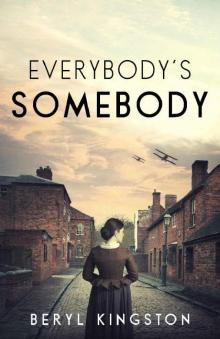 Everybody's Somebody
Everybody's Somebody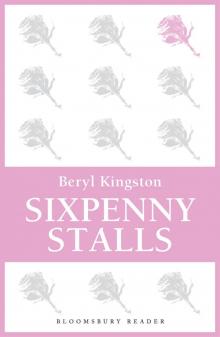 Sixpenny Stalls
Sixpenny Stalls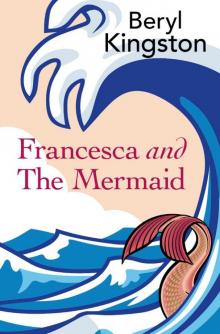 Francesca and the Mermaid
Francesca and the Mermaid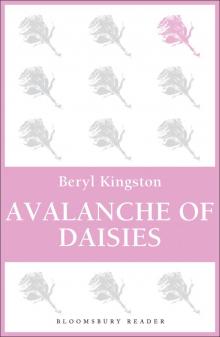 Avalanche of Daisies
Avalanche of Daisies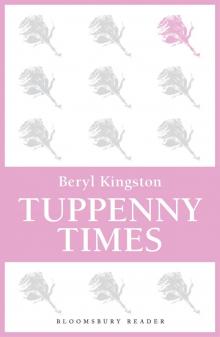 Tuppenny Times
Tuppenny Times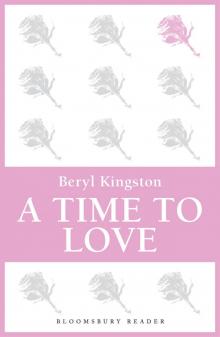 A Time to Love
A Time to Love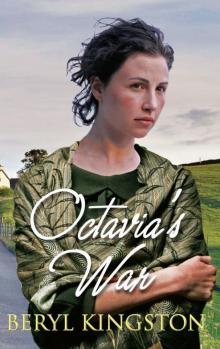 Octavia's War
Octavia's War Gemma's Journey
Gemma's Journey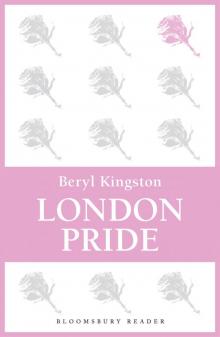 London Pride
London Pride Gates of Paradise
Gates of Paradise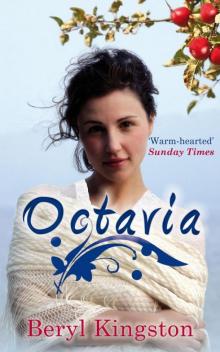 Octavia
Octavia Off the Rails
Off the Rails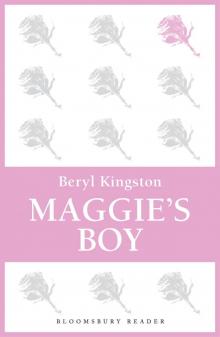 Maggie's Boy
Maggie's Boy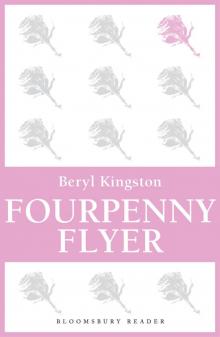 Fourpenny Flyer
Fourpenny Flyer